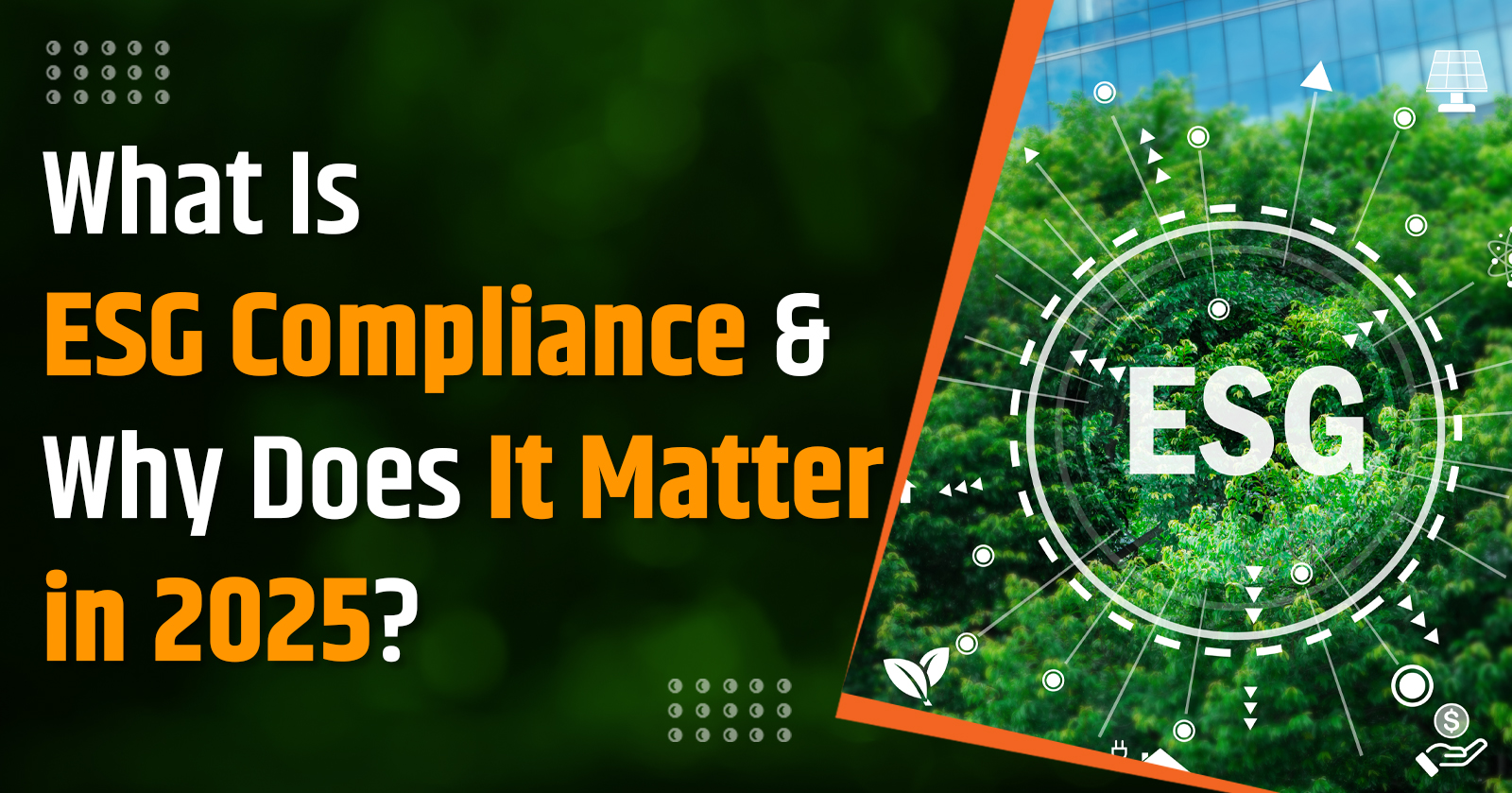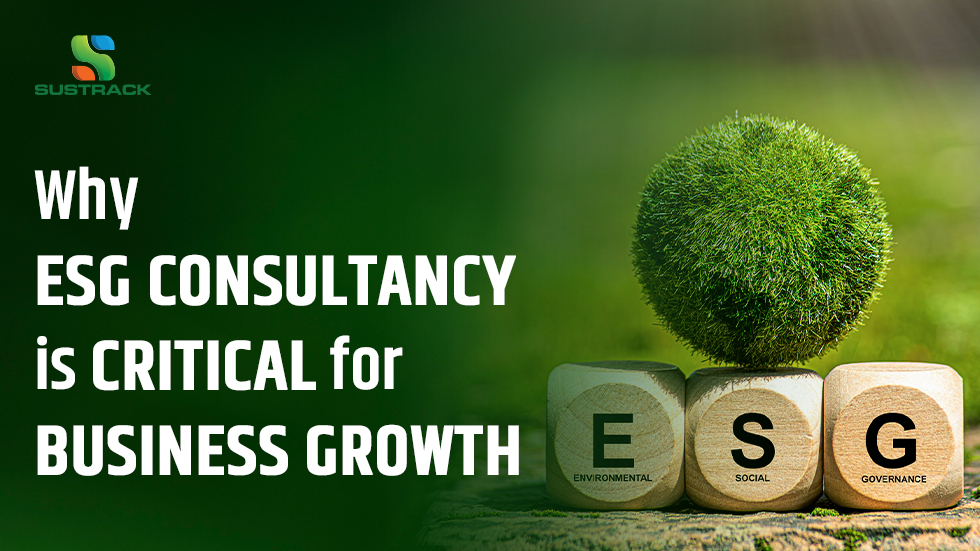What Is ESG Compliance and Why Does It Matter in 2025?

Currently, ESG (Environment, Social, & Governance) Compliance has been imposed as a compulsion on the Organisations and is no longer optional. The Government has made up new & stricter reporting mandates and Sustainability Regulations that need to be obeyed by all to curb carbon emissions, the rising investor scrutiny, and customer demands for responsible practices. Many companies ignore the ESG risk and lose relevance, reputation, and revenue
Due to a change in the climate, which impacts the supply chain accountability, the businesses are expected to disclose their financial performance to the investors, but their sustainability footprint as well. ESG Compliance has become a benchmark for trust, transparency, & growth between the firms and investors, and regulators. Let us put it in simple words below in the blog:
What is ESG Compliance?
ESG Compliance is a procedure where a Firm can Synchronize its operations, policies, and reporting with established Environmental, Social, and Governance (ESG) standards and sustainability regulations. Through these Sustainability regulations, an Organisation not only focuses on its profit margins, but also takes responsibility for the impact on the Environment, social commitment, and governance practices, and complies with evolving reporting mandates. Currently, in 2025, ESG Compliance has moved from being a voluntary choice to an essential expectation for companies of all sizes.
- Environmental (E): Through managing the Carbon Footprint, Renewable Energy Use, Municipal Waste, Water, and Pollution to reduce Ecological Impact in line with sustainability regulations.
- Social (S): By ensuring Employee Welfare, Diversity, Labour Rights, and Community Engagement for stronger Stakeholder Trust.
- Governance (G): By Upholding Ethics, Transparency, and Accountability in Leadership, Disclosures, and Decision-Making.
| Basis Of Distinction | ESG Compliance | Sustainability Reporting |
|---|---|---|
| Definition | Synchronizing the business operations with the established ESG frameworks, sustainability regulations, reporting mandates and investor requirements. | Publicly disclosing the Environmental, Social, and Governance performance and impacts. |
| Focus | ESG Compliance meets the rules, standards, and regulatory obligations. | Communicating efforts, results, and progress to stakeholders. |
| Managed By | Authorities, Regulators, investors, and rating agencies. | The company’s transparency goals, stakeholder expectations, and global reporting frameworks. |
| Frameworks & Standards | SEBI, ISSB, SASB, and mandatory ESG disclosure norms. | GRI Standards, ISSB guidelines, CDP, Integrated Reporting, Voluntary Disclosures. |
| Nature | Mandatory (Increasing in 2025) | Voluntary |
Why ESG Compliance Matters in 2025?
As discussed above, ESG compliance is no longer optional in 2025; it has become essential for businesses. We have discussed below the reasons why ESG Compliance matters:
- Regulatory Push: To meet the expectations of the Investors, the ESG Reporting mandates has been made mandatory by SEBI’s BRSR framework in India, sustainability regulations & GRI standards globally.
- Investor Expectations: That the capital flows with transparency and credible ESG Disclosure in the Company.
- Market Competitiveness: Through ESG Compliance, a brand value is built, customer loyalty, & market differentiation become straightforward.
- Risk Management: ESG laws, supported by ESG Audits, help businesses to address climate risks, supply chain challenges, and reputational threats.
Challenges in ESG Compliance
Even if the ESG Laws are mandatory, there are many businesses that continue to face several hurdles in adopting them effectively. Some of the most common challenges include:
- Fragmentation of Reporting Frameworks
The frameworks & standards, such as GRI, SASB, ISSB, & CSRD, all fall under the evolving sustainability regulations, and the organisations often have to juggle to decide which type of framework would be best suited for their organisation. This lack of information creates a lot of confusion, which increases workload, due to which cross-border comparisons get difficult between the standards & frameworks.
- High Costs for SMEs
For the companies that are small and medium-sized enterprises, adopting and implementing ESG practices is out of budget. The ESG Audits, data collection tools, and compliance reporting often feel a lot burdensome, especially when margins are already tight.
- Lack of Expertise and Data Credibility
Without proper expertise, data collection and ESG audits may be unreliable, weakening the credibility of reports and making it harder to gain investor trust or meet regulatory requirements.
- Balancing Short-Term Profit vs. Long-Term Sustainability
The organisations juggle to justify the ESG investments due to immediate financial pressures. To match up the expectations of the investors for short-term returns with long-term sustainability becomes a significant roadblock.
The Future of ESG Compliance
As ESG Reporting mandates have become mainstream in 2025, their future is set to reshape how businesses operate over the next five years. Below are some key trends that Businesses should start applying:
- Trends Ahead: AI, IoT, and blockchain will drive real-time ESG compliance monitoring and investor reliance on ESG ratings.
- Core Integration: ESG Audits ensure these ESG Laws will transition from a compliance checklist to a core component of strategy, supply chains, and product design.
- Penalties & Incentives: The Government of India has applied stricter fines for non-compliance and rewards like tax benefits and green financing for ESG leaders.
Conclusion
ESG Compliance is not about ticking boxes but analysing the growth of the Company. In the current year, companies that have adopted ESG will attract investors’ trust, market leadership, and long-term resilience.
Sustrack helps out these firms in measuring, managing, and disclosing their ESG performance with accuracy, conducting credible ESG Audits, and ensuring compliance with sustainability regulations like GRI, ISSB, and CSRD, from reducing the carbon emissions impact to improving the Investors’ trust. Sustrack enables the firm to turn ESG compliance into a competitive advantage and a growth driver.



